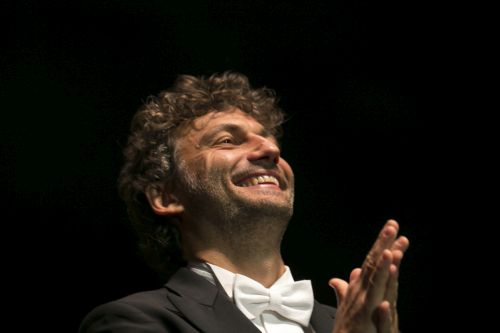 Spain Verdi, Massenet, Wagner: Jonas Kaufmann, Orquestra de Cadaqués, Jochen Rieder (conductor), Castle Gardens Auditorium, Castell Perelada, Spain, 3.8.2014 (JMI)
Spain Verdi, Massenet, Wagner: Jonas Kaufmann, Orquestra de Cadaqués, Jochen Rieder (conductor), Castle Gardens Auditorium, Castell Perelada, Spain, 3.8.2014 (JMI)

Jonas Kaufmann:
Verdi: Don Carlo, “Io la vidi”
Il Trovatore, “Ah, si ben mio”
La Foza del Destino, “La vita è un inferno…O tu che in seno agli angeli”
Massenet: Le Cid, “O souverain, o juge, o père”
Wagner: Die Walküre, “Ein schwert verhiess mir der vater”
Wesendonck Lieders, “Schmerzen” and “Träume”
Parsifal, “Amfortas! Die Wunde!”
Orchestra:
Massenet: Le Cid, Overture
Verdi: Il Trovatore, Ballet Music
La Forza del Destino, Overture
Bizet: Carmen, Prelude to Act III and Micaela’s aria
Wagner: Der Fliegende Holländer, Overture
Die Meistersinger von Nürnberg, Prelude to Act III
Parsifal, Prelude to Act III
Jonas Kaufmann’s concert had aroused huge interest in Spain: there are not many opportunities to see him on stage in our country. There’s no doubt that he is the tenor of the moment, especially because of his versatility which enables him to cover a wide repertoire. The evening was a big success for the Bavarian tenor, beginning with the fact that he was able to completely fill the Perelada auditorium. But it’s worth going into some detail on the concert to try to explain why the audience was not particularly warm until the encores.
In my view,the program had some problems. Singing in an opera house is not the same as performing in an outdoor auditorium with a more festive audience. The conductor and orchestra were given too large a role and went far beyond filling the time that the singer needs to rest between arias. Jonas Kaufmann sang for exactly 41 minutes during the official program, while the orchestral pieces went on for 50 minutes. In addition, the Wagner works chosen by Kaufmann were very interesting for true opera lovers, but not so much for the audience at Perelada. Hence during the official concert there was little enthusiasm.
It was not until the first two encores ̶ an excellent “Donna non vidi mai” and, above all, Federico’s lament (“È la solita storia del pastore”), where Kaufmann was particularly moving in his interpretation ̶ that the audience went wild. Indeed, it was Federico who put Perelada at Kaufmann’s feet. The concert came to an end with the audience cheering Mr. Kaufmann in his final encores (from Lehár’s Paganini and The Land of Smiles).
In the first part of the concert, Mr. Kaufmann sang the aria from Act I of Don Carlo, which went almost unnoticed. He was much better in Trovatore’s “Ah, si ben mio,” which he sang beautifully; and in Don Alvaro’s recitative and aria “O, tu che in seno agli angeli,” which was superb although with some excess of mannerism. He finished the first half with the aria from Le Cid, “O souverain, o juge, o père,” which was rather short of emotion for my taste.
The second part was dedicated to Wagner, and here Mr. Kaufmann proved that he is unrivalled today in this repertoire. He was particularly excellent singing “Amfortas! Die Wunde!” from Parsifal, although the audience did not show any fervor.
Mr. Kaufmann was accompanied by the no-more-than-correct Cadaqués Orchestra, conducted by the mediocre Jochen Rieder. He was at the service of Mr. Kaufmann, as he should be, but he also had 50 minutes for himself and proved not to be up to the task.
I hope we in Spain can enjoy Jonas Kaufmann’s artistry again soon.
José Mª Irurzun